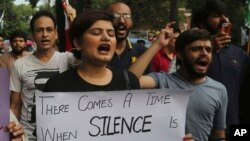ປາກິສຖານເວົ້າວ່າ ຕົນໄດ້ຂັບໄລ່ຂ້າຫລວງໃຫຍ່ຂອງອິນເດຍ ປະຈຳອິສລາມາບັດ ອອກຈາກປະເທດໃນເວລາພຽງບໍ່ເທົ່າໃດຊົ່ວໂມງ ພາຍຫລັງທີ່ມີການຫລຸດລະດັບສາຍສຳພັນທາງການທູດ ແລະການຄ້າກັບນິວເດລີ ຍ້ອນອິນເດຍໄດ້ຍົກເລີກຖານະພິເສດ ຂອງແຄວ້ນແຄັສເມຍ ໃນຂະນະທີ່ສາຍພົວພັນສອງຝ່າຍລະຫວ່າງປະເທດດັ່ງກ່າວເຊື່ອມໂຊມລົງ.
ກະຊວງການຕ່າງປະເທດຂອງປາກິສຖານກ່າວຢູ່ໃນການປະກາດແບບຫຍໍ້ໆວ່າ ຕົນໄດ້ແຈ້ງໃຫ້ລັດຖະບານອິນເດຍຊາບວ່າ ປາກິສຖານຈະບໍ່ສົ່ງຂ້າຫລວງໃຫຍ່ຂອງຕົນທີ່ຖືກມອບໝາຍ ໃຫ້ໄປປະຈຳຢູ່ອິນເດຍນັ້ນເຊັ່ນກັນ.
ກ່ອນໜ້ານນັ້ນ, ເຈົ້າໜ້າທີ່ທ່ານນຶ່ງໄດ້ປະກາດວ່າ ກອງປະຊຸມດ່ວນຂອງຄະນະກຳມະການ ດ້ານຄວາມໝັ້ນຄົງຂອງຊາດ ຊຶ່ງລວມມີ ຜູ້ນຳຂັ້ນສູງທາງພົນລະເຮືອນ ແລະທະຫານ ໄດ້ຕັດສິນໃຈຫລຸດລະດັບສາຍພົວພັນທາງການທູດ ແລະການຄ້າກັບອິນເດຍລົງ ຊຶ່ງລວມຢູ່ໃນຫລາຍໆບາດກ້າວທີ່ຕອບໂຕ້ຕໍ່ “ການກະທຳຕາມລຳພັງຝ່າຍດຽວ ແລະຜິດກົດໝາຍ" ຂອງລັດຖະບານອິນເດຍ.
ໂດຍປາດສະຈາກຄຳອະທິບາຍໃດໆ ປະເທດດັ່ງກ່າວເວົ້າວ່າ ປາກິສຖານ ຈະບໍ່ທົບທວນການພົວພັນສອງຝ່າຍດ້ານອື່ນໆ ກັບອິນເດຍ ແລະຈະນຳເອົາບັນຫາກ່ຽວກັບແຄວ້ນແຄັສເມຍຂຶ້ນໄປຫາອົງການສະຫະປະຊາຊາດ, ລວມທັງສະພາ ຄວາມໝັ້ນຄົງຂອງອົງການດັ່ງກ່າວນຳ.
"ທ່ານນາຍົກລັດຖະມົນຕີໄດ້ສັ່ງໃຫ້ກຳລັງປະກອບອາວຸດສືບຕໍ່ເຝົ້າລະວັງ," ນັ້ນຄືຄຳເວົ້າທີ່ກ່າວຢູ່ໃນຄຳປະກາດດັ່ງກ່າວ ໂດຍໄດ້ກ່າວອ້າງເຖິງສະພາບການຢູ່ໃນເສັ້ນແດນທີ່ຄວບຄຸມທາງທະຫານ ທີ່ແບ່ງເຂດແດນລະຫວ່າງສ່ວນທີ່ເປັນຂອງປາກິສຖານ ແລະຂອງອິນເດຍຢູ່ໃນແຄວ້ນແຄັສເມຍ.
ນິວເດລລີ ໄດ້ເອົາຂໍ້ກຳນົດພິເສດອັນນຶ່ງເພີ້ມເຂົ້າໃສ່ໃນລັດຖະທຳມະນູນ ປີ 1949 ຂອງຕົນ ທີ່ໄດ້ເອົາສິດປົກຄອງຕົນເອງໃຫ້ແກ່ແຄວ້ນແຈມມູແລະແຄັສເມຍ, ໂດຍອະນຸຍາດໃຫ້ແຄວ້ນດັ່ງກ່າວ ສາມາດມີລັດຖະທຳມະນູນຂອງຕົນເອງ, ມີທຸງຂອງຕົນເອງຕ່າງຫາກ, ແລະມີເອກກະລາດໃນເລື້ອງຕ່າໆທັງໝົດ ຍົກເວັ້ນດ້ານການພົວພັນຕ່າງປະເທດ, ການປ້ອງກັນຊາດ ແລະການສື່ສານ. ລັດຖະບານທີ່ນຳພາໂດຍພັກຮິນດູຫົວຊາດນິຍົມ ໄດ້ທັບມ້າງຂໍ້ກຳນົດທາງລັດຖະທຳມະນູນດັ່ງກ່າວໃນວັນຈັນຜ່ານມາ.
ໃນວັນອັງຄານຜ່ານມານັ້ນ ສະພາຂອງອິນເດຍໄດ້ຮັບຜ່ານຮ່າງກົດໝາຍ ຊຶ່ງໄດ້ໃຫ້ການອະນຸມັດແກ່ການເຄື່ອນໄຫວດັ່ງກ່າວ ຊຶ່ງລວມທັງການແຍກເອົາສ່ວນທີ່ເປັນຂອງຕົນຢູ່ໃນດິນແດນທີ່ແບ່ງແຍກກັນໃນລັດທີ່ຢູ່ເທິງພູເຂົາຫິມະໄລແຫ່ງນັ້ນ ທີ່ທັງນິວເດລີ ແລະອິສລາມາບັດໄດ້ອ້າງເອົາກຳມະສິດວ່າ ທັງໝົດ ເຂດນັ້ນເປັນຂອງຕົນເອງ.
ບໍ່ເທົ່າໃດຊົ່ວໂມງຕໍ່ມາ, ສະພາຂອງປາກິສຖານ ກໍໄດ້ຮັບຜ່ານມະຕິທີ່ປະນາມ ມາດຕະການຂອງອິນເດຍທີ່ໄດ້ປ່ຽນແປງຖານະຂອງແຄວ້ນທີ່ມີການແບ່ງແຍກກັນແຫ່ງນັ້ນ ແລະທວງໃຫ້ນິວເດລີ ຍົກເລີກຂໍ້ກຳນົດທີ່ກີດກັນດ້ານຄວາມໝັ້ນຄົງຢ່າງກວ້າງຂວາງຂອງປະເທດດັ່ງກ່າວທີ່ໄດ້ວາງອອກຕໍ່ແຄວ້ນແຄັສເມຍ ນັບແຕ່ວັນຈັນແລ້ວເປັນຕົ້ນມານັ້ນ.
ອ່ານຂ່າວນີ້ເພີ້ມເປັນພາສາອັງກິດຢູ່ລຸ່ມນີ້
Pakistan says it is expelling India's high commissioner to Islamabad, just hours after downgrading diplomatic and trade ties with New Dehli for stripping the disputed Kashmir region of its special status, as bilateral relations continue to deteriorate.
The foreign ministry said in a brief announcement the Indian government has also been informed that Pakistan will not be sending its High Commissioner-designate to India.
Earlier, an official announcement said that an emergency meeting of the National Security Committee, which includes top Pakistani civilian and military leaders, had decided to lower diplomatic and trade ties with India among other steps in response to the "unilateral and illegal actions" by the Indian government.
It said without elaborating that Pakistan will review other bilateral arrangements with India and take the Kashmir matter to the United Nations, including the Security Council.
"(The) Prime Minister directed armed forces to continue vigilance," the announcement noted, citing the situation on the military line of control separating Pakistani and Indian portions of Kashmir.
New Delhi added a special provision to its constitution in 1949 giving autonomy to Jammu and Kashmir, allowing the region to have its own constitution, a separate flag and independence over all matters except foreign affairs, defense and communications.India's Hindu nationalist-led government scrapped the constitutional provision Monday.
On Tuesday, the Indian parliament passed a bill giving its approval to the move, including splitting its part of the divided Himalayan state both New Delhi and Islamabad claim in its entirety.
Hours later, the Pakistani parliamentpassed a resolution condemning India's measures to alter the status of the divided region and demanding New Delhi lift its wide-ranging security lockdown imposed on Kashmir since Monday.
The Indian security action to prevent a possible backlash, particularly from insurgents fighting New Delhi's rule in Kashmir, has plunged the region into a communications blackout and a virtual shutdown.
Pakistani Prime Minister Imran Khan told the emergency joint session of the parliament on Tuesday that the Indian action to "annex" Kashmir would intensify the insurgency in the majority-Muslim Kashmir, and the ensuing tensions could trigger another war between India and Pakistan, both armed with nuclear weapons.
The Pakistani leader warned the conflict could eventually lead to an exchange of nuclear weapons, urging the international community to intervene and press India to reverse its controversial decisions and resolve the Kashmir dispute through negotiations.
Islamabad rejects New Delhi's allegations the Pakistani military is behind separatist groups in Kashmir.
"The next time there is a major attack on Indian forces in Kashmir, the next India-Pakistan crisis will be upon us. And it could get ugly," cautioned Michael Kugelman, a Washington-based expert on South Asia affairs.
In a significant clarification issued Wednesday, a senior U.S. State Department official rejected Indian media reports New Delhi had informed Washington ahead of its Kashmir-related moves.
"Contrary to press reporting, the Indian government did not consult or inform the US Government before moving to revoke Jammu and Kashmir's special constitutional status," tweeted Alice Wells, the principal deputy assistant secretary of state in charge of South and Central Asian affairs.
Wells is currently in Islamabad for official talks with Pakistani leaders on bilateral matters.
A U.S. State Department spokesperson said Monday, the administration was "closely" following developments in Kashmir. "We are concerned about reports of detentions and urge respect for individual rights and discussion with those in affected communities, said Morgan Ortagus said in a statement.





